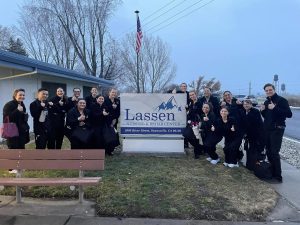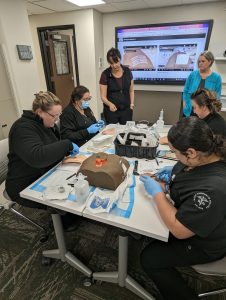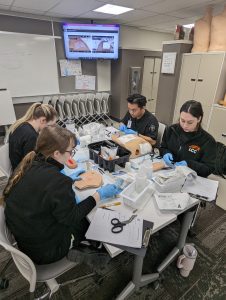 Lassen College’s new RN program
Lassen College’s new RN program
When it comes to the urgent need for new nurses in the Far North, “RN” might as well stand for “Right Now.”
With demand amplified by the global health crisis, the Susanville community’s call for RNs just keeps getting louder. Now, Lassen Community College is employing a DIY mindset, finding new ways to inject highly skilled professionals into the region’s nursing workforce.
“Susanville is small, and it’s very, very special,” says Christi Myers, Susanville native and Director of Nursing and Allied Health at Lassen Community College. “We have so much beauty here, but getting people from other areas to want to come here and work and jump into the lifestyle we live … we’re much slower pace than the big cities.
“We’re hoping with that, we’ll have some impact on getting some people that already know and love our community to want to stay here and work here.”
The effort began with a high school healthcare pathway a few years ago, which provided high school students a chance to earn credits that transfer directly into the new Registered Nursing program. The system is beginning to work, with K-12 cohorts already leveling up to LCC.
The College’s goal, since rebooting the Licensed Vocational Nursing program in 2017, was to set the foundation for a Registered Nursing program. After a labor-intensive process which entailed digging through the research, compiling feasibility studies, ensuring worthwhile clinical placement opportunities, and completing state requirements, the RN program finally welcomed its inaugural class this year.
“We were able to jump in and start in January with our current cohort of Registered Nursing students and so far, they’re doing fantastic,” shares Myers. “They’ve just started their clinical rotations down at the Skilled Nursing Facility … They start there and then move into different areas of care.”
These real-world opportunities afford students well-rounded experience in various healthcare specialties, including pediatrics, labor and delivery, mental health facilities, medical surgery clinics, and more. And unlike some of its big-city counterparts, LCC can promise an intimate, uncrowded experience. With fewer student nurses in the room, says Myers, there is more opportunity for participation during clinical rotations. Instead of standing on the wall, her students are “elbows deep” in nursing responsibilities.

“Every single one of our students that has gone through our LVN program has had an opportunity to be active in a baby being born, they’ve actually had the opportunity to provide nursing care,” says the director. “We’re really grateful to our clinical sites for allowing us to bring in new students and overwhelm them with all of these RNs. They’re really excited to see it.”
The two-year RN program prepares ambitious students with the full range of essential skills, from performing basic care and comfort to patients, to administering medications, care management, and more. RN students attend the LCC program three days a week with one day of lab, one day of clinicals, and one day of lecture, accruing knowledge and skills vital to passing the National Council Licensure Examination for Registered Nurses (NCLEX-RN)
“These individuals are motivated to advance their nursing careers, expand their knowledge base, and make meaningful contributions to patient care and their communities,” explains LCC nursing instructor Celeste Wiser, who has already hosted the College’s first cohort of future RNs.
With Strong Workforce Program funding helping support the program with faculty, equipment, and additional learning materials, LCC is more prepared than ever to provide the Susanville community with a reliable pipeline of registered nurses.
This is especially pertinent, as California is still experiencing one of the largest nursing shortages in the country. Owing to the effects of the global health crisis, many individuals left the profession in recent years due to factors like anxiety, stress, and general burnout from understaffed facilities. In fact, California projects a deficit of about 44,500 registered nurses by 2030.
Throughout the state and region, traveling nurses are filling in the gaps to assume these essential roles.
“It’s a really huge struggle for our facilities to be able to afford that type of staffing, but there are cases when it’s the only option because we don’t have enough nurses,” Myers says about travel nurses. “They’re fantastic, but they’re expensive.”
To help alleviate the need and accelerate the solution, LCC also recently introduced the Licensed Vocational Nursing to Registered Nursing bridge program. This setup allows LVN grads to fast-track their education and earn their RN certification in half the time.
The response was immediate. Eager to secure one of the 23 seats available in the debut cohort, about 20 LVN-to-RN hopefuls managed to apply within the first 10 hours.
 “Until we opened, the only opportunity for that [program] was at least two hours away, if they could even get into a school,” explains Myers. “The waitlists for our region are beyond overfilled.”
“Until we opened, the only opportunity for that [program] was at least two hours away, if they could even get into a school,” explains Myers. “The waitlists for our region are beyond overfilled.”
When it comes to the job itself, the director says LVNs and RNs are more alike than ever. In addition to assuming more administrative work, Registered Nurses tend to receive more formal classroom training over the course of two years, and often assume more leadership roles while on the job.
“The job difference between LVN and RN is not what it used to be,” details Myers. “As far as back-breaking work, it’s very similar.”
The biggest real difference between the two jobs? The paycheck. According to the Occupational Information Network (ONET), LVNs earn an average annual salary of $66,090 in California, while RNs command nearly double that figure. Currently, the average median salary for RNs in the North Valley-Northern Mountains Region of California levels out at $129,020.
“To be able to advance their careers and make substantially more money doing essentially very similar jobs, with some extra added responsibilities, is going to be a huge thing for them,” says Myers.
“We have so many local LVNs that are really going to do amazing as registered nurses.”
Even more important, suggests Wiser: more local RNs means a healthier community. “By advancing their nursing education, individuals can gain a deeper understanding of healthcare disparities and social determinants of health that affect the Susanville community,” says the instructor.
With a thorough understanding of the healthcare services needed in the region, the benefits of the program spread tenfold.
“RNs can work towards reducing these disparities by advocating for equitable access to healthcare services, addressing cultural barriers, and promoting health equity initiatives tailored to the community’s unique needs,” predicts Wiser.
Sources:
https://www.registerednursing.org/articles/largest-nursing-shortages/
https://www.onetonline.org/link/localwages/29-1141.00?zip=96130
March 2024